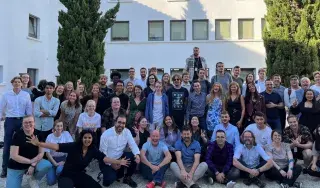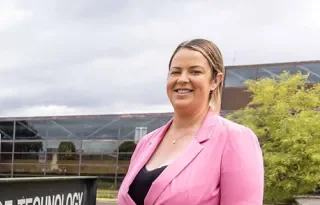DkIT Computing Students Participate in Portuguese Blended Intensive Programme
A group of ten students from DkIT’s Department of Visual & Human-Centred Computing travelled to ISPGAYA, which is in the Portuguese city of Porto from September 18th to 25th 2022 to participate in an Erasmus+ Blended Intensive Programme (BIP). The main objective for this event was to deliver instruction and guidance on user-centred and user experience (UX) design, and the operation of cross-discipline student project teams (IT, Software Development, Business & Management). Cooperating 3rd level colleges from Ireland, France, Slovakia and Portugal took part in the event.

The week-long, face to face physical activity supported team formation, concept generation, planning and guidance as well as targeted instruction in Entrepreneurship, Business modelling, UX design, Agile Project Management and Mobile App prototyping.
The BIP provided a very high level of added value for the students, as it combined modern software development practices (Agile development and UX Design), user-centred design (including Universal Design and Accessibility), and entrepreneurial and business modelling approaches. The BIP took place in a cross-cultural, transnational context, which promoted broader goals and contexts relating to entrepreneurship, digital citizenship and sustainability. It also supported key strategic objectives for all institutions involved in terms of international cooperation, student and teacher mobility and exchange, blended learning and inter-disciplinary project work. It also provided for significant opportunities for academic staff to explore and development of potential new programmes, pedagogical practices and research.
The week-long, face to face intensive programme, gave the best environment for team formation, SWOT analysis, idea generation, and concept forming within a broad thematic framework. It also provided for intensive and focused instruction and application of key tools (e.g. for Agile Process and project management, core technologies and toolkits for rapid application prototyping as well business planning). The virtual part (operating over the following three months) provides for teams to continue to work on the iterative design and development of a working mobile app (prototype) and a coherent business plan and user-case scenario. This is submitted, presented, and assessed on-line at the end of the virtual stage.
Students gained many significant benefits (and indeed challenges) arising from the intensive nature of the initial phase, the national, cultural and languages presenting, the cross-disciplinary nature of the teams (IT, Software, Business & Management), and the varying level of progressions (2nd, 3rd and final-year students). These skills are vital for successful operation of group projects and assessments in 2nd, 3rd, and 4th year. These skills are also highly valued by employers, both for work placement and after graduation.
Academic staff have also gained significant benefits from the shared delivery of specialist topics (e.g. Agile Process, UXD, Business Planning) around a set of common objectives. There is also a significant benefit gained from the comparison and consideration of similarities and differences between teaching methods, tools and techniques used and innate cultural and national differences and contexts.



